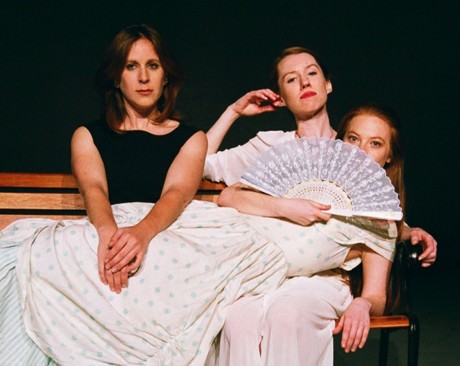It is no mere flattery to say that Triptych Productions’ The Confines of Flattery provides a delightful and intriguing hour at the theater. A trio of short plays from three quite different eras, with nothing more in common at first glance than a focus on two women, turn out to complement and comment on each other beautifully.
The first, Molière’s The Affected Young Ladies (directed by Heather Benjamin), with just a few costume pieces (brocade waistcoats or coats and ruffled shirts over modern trousers for the gentlemen, full gathered skirts and plain blouses for the women) and vaguely antique-looking chairs and floral sofa, quite capably conveys the 17th century French setting on the minimalist thrust stage of the Redrum. The actors’ graceful gestures, elegant diction and especially the ladies expert fan-handling does the rest. Mascarille (Mitchell Grant), the classic foppish marquis, is extremely funny in his over-the-top (literally – several times he jumps on a chair and narrowly misses knocking the lights askew with his head) romanticism and pretentious poetry. As the two women, Cathos (Kelsey Meiklejohn) is graceful and amusingly earnest with consonants like crystal, and Magdelon (Julia Morrissey) shines with her smoky voice and absolute command of all the intricacies of Molière’s text.

In the later plays, updated costumes and period-appropriate intro music set the scene. The second, Molnár’s early 20th century A Matter of Husbands, is the most conventional of the three– two women arguing over a man; but with its O. Henry-like twist, it proves amusing nonetheless. Kelsey Meiklejohn’s innocence works well as The Earnest Young Woman (although her utterly perfect diction almost distracts in this role) and Heather Benjamin’s cool elegance suits the Famous Actress, although it would have been even more satisfying to see more going on beneath the calm.
The third, Frederick Stroppels 21th century (well, 1999, but close enough) The Mamet Women, (directed by Lizzi Albert) is the most original and amusing of the three. It parodies David Mamet’s macho posturings by giving his balsy, profanity-laden dialogue to two women talking about Tupperware. Julia Morrissey demonstrates breathtaking versatility as the hilariously urban-tough Sally, while Heather Benjamin’s Polly provides a fine foil. Different as this piece is, it ties in remarkably well with the first in the strange Runyonesque formality of some of its language and its concern with “honor” and “contracts.”
Taken together, these three plays provoke interesting and even unsettling thoughts about women’s portrayal in theater. The progression shows how far we’ve come… the third play passes the “Bechdel Test” of having two female characters discussing something other than a man, but at the same time, is what they’re discussing any more important than the romance, poetry and word games lampooned by Molière? And why do all three pieces (all penned by men) involve women getting tricked (to put it euphemistically), more often than not by another woman?
But then, these are comedies; there’s no need to take them too seriously.
Flattery will get you everywhere… go see it.
LINK
For more information and to purchase tickets, read our Fringe Preview.




